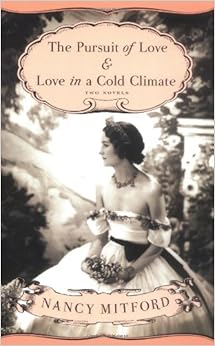The Pursuit of Love: Fast, merry, and delightful. The entire story reads like a friend gossiping to you, without becoming trite in any way. Though it took place during wartime, the tone consistently stayed bright throughout, and delivered plenty of humor to keep me engaged as I sped through every sentence. The contrast between the narrator and Linda was just right, too, I think, and I really do think that Mitford is a very engaging storyteller. This is very much a woman's novel, and I could imagine it to be the equivalent of chick lit today in its day, but it's in no way a guilty read. The way it ended! Hilarious! "The doctors who said that Linda ought never to have another child were not such idiots after all. It killed her." Bam. She died. So to the point out of nowhere when the whole story was about her. So randomly brilliant, I'm still recovering.
Love in a Cold Climate: If Linda is a whirlwind, Polly is a stone. Unlike the Alconleighs, who were so personable and warm, the Montdores are distant and chilly. With The Pursuit of Love, I felt drawn in and included, whereas with Love in a Cold Climate I felt distant and a bit melancholy. It felt, too, a bit older (matured), like our eyes were opened to the truth whereas in Linda's story we were all (quite obviously) blinded by youth and romance. Mitford's wit was still there, and there were spells of humor from the first story that would occasionally peek out, winking at you, but altogether, the two are very different stories curiously spanning the same periods. With Lady Matdores' superficiality, however, Cold Climate felt a little more mainstream to stories of aristocracy, and therefore slightly less original.
The biggest mystery to me though, is why everyone loves Davey so much, and seriously, how isn't he gay?
A writer's conversations & response to the 1001 Books You Must Read Before You Die list.
Thursday, May 14, 2015
Saturday, May 2, 2015
Kafka on the Shore
Another Murakami. The most popular, as far as I'm concerned, but to me, the least satisfactory. The entire novel felt disconnected, like I was set on a treadmill at walking pace, without any goal in sight. At least in his previous novels there was some sort of goal to be worked after. As expected, the story quietly ended with no resolution or really any attempt at sense.
I'm not sure if this reaction is due to the fact that I've read so many of his books now and am tired of his style, or that Kafka really was a lackluster work. Sure, some of the characters were interesting and likable, but it was hard to care about anything happening at all. It feels more like I was introduced to them for a brief period, and now will forget them all without effort. And "The Boy Named Crow" was really just annoying, and made no sense to me. If you're going to personify the conscience, do it with purpose. I'd like to know what Murakami's intent in writing all of these stories are. Maybe he's like Miss Saeki in this story, writing for no one and no reason.
Per usual, the world of Murakami in Kafka was muted and quiet. Lack of feeling, but uneasy, like a surrealist painting. This feeling bleeds into real life when I read his writing, so now that it's spring, maybe I'm glad that I'm through with his books. At least for a while.
I'm not sure if this reaction is due to the fact that I've read so many of his books now and am tired of his style, or that Kafka really was a lackluster work. Sure, some of the characters were interesting and likable, but it was hard to care about anything happening at all. It feels more like I was introduced to them for a brief period, and now will forget them all without effort. And "The Boy Named Crow" was really just annoying, and made no sense to me. If you're going to personify the conscience, do it with purpose. I'd like to know what Murakami's intent in writing all of these stories are. Maybe he's like Miss Saeki in this story, writing for no one and no reason.
Per usual, the world of Murakami in Kafka was muted and quiet. Lack of feeling, but uneasy, like a surrealist painting. This feeling bleeds into real life when I read his writing, so now that it's spring, maybe I'm glad that I'm through with his books. At least for a while.
Subscribe to:
Posts (Atom)

